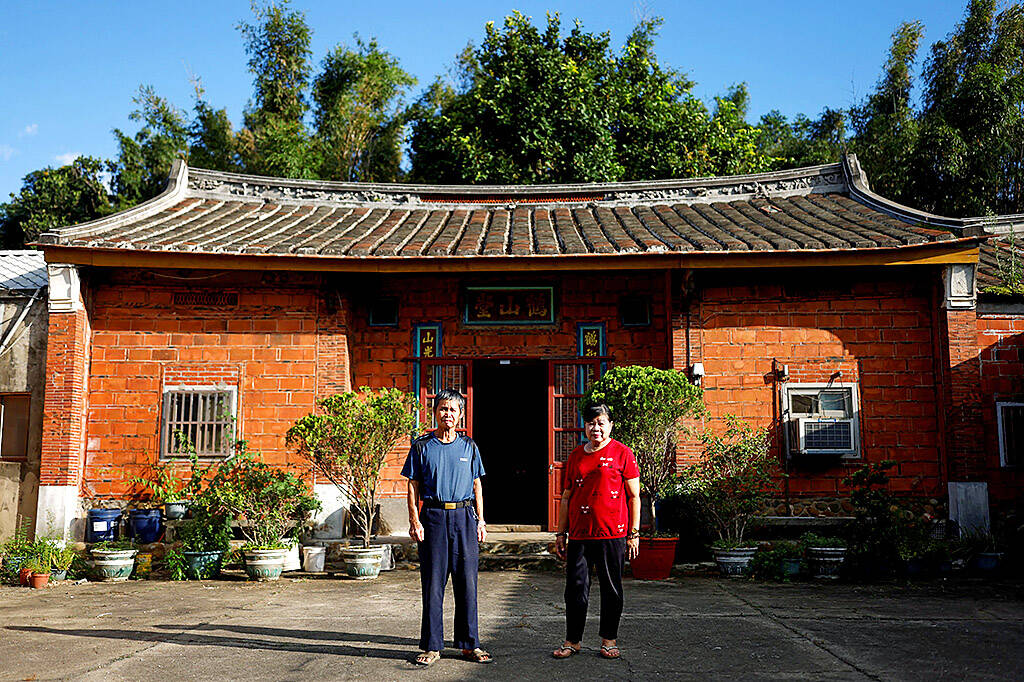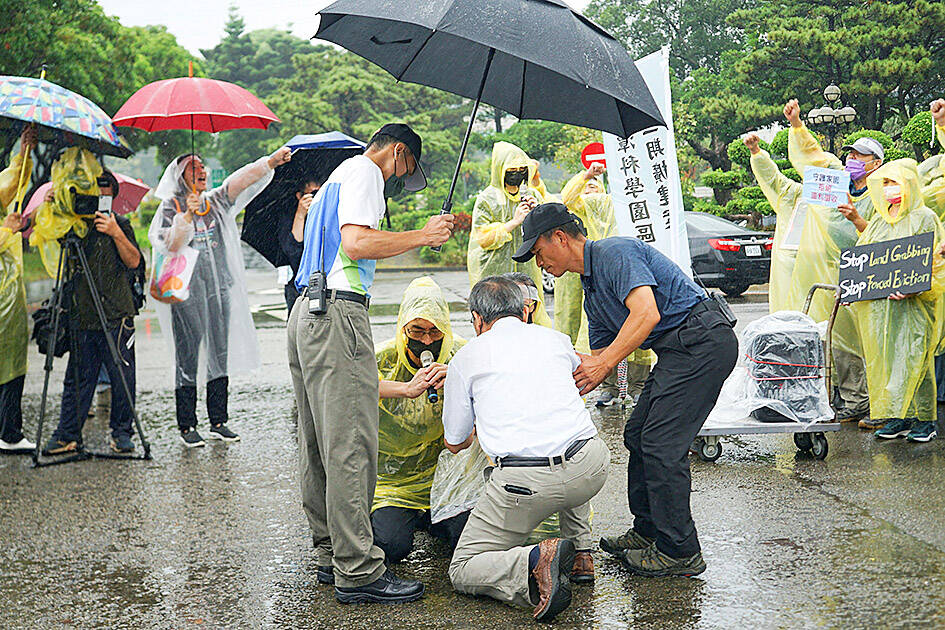Wearing rain ponchos and holding photos of their ancestral temples near Hsinchu, Taiwan’s semiconductor capital, 40 residents braved lashing winds in early last month to protest plans to take their rural land for cutting-edge chip production.
Two weeks later, Taiwan Semiconductor Manufacturing (TSMC), the world’s largest contract chipmaker, dropped plans to build a factory as part of the science park expansion in the bucolic Longtan district nearby — a development that heartened protesters and laid bare one of Taiwan’s increasingly fraught “five shortages.”
If the land crunch on the densely populated and mountainous island pushes TSMC to shift more production outside Taiwan — countries such as the US, Japan and Germany have offered it billions in incentives to do so — it could weaken the backbone of Taiwan’s economy, analysts say.

Photo: Reuters
“TSMC’s expansion in Taiwan has strategic significance for Taiwan’s economy and national security,” Minister of Economic Affairs Wang Mei-hua (王美花) told reporters after the announcement by TSMC, known on the island as “the sacred mountain protecting the country.”
Last year, Taiwan’s chip industry generated NT$4.837 trillion (US$150.27 billion) in revenue, nearly half of which came from TSMC, compared with Taiwan’s GDP of NT$22.667 trillion (US$704.21 billion). The sector employs 327,000 people and creates 704,000 jobs indirectly, according to the ministry.
With TSMC making most of the world’s advanced chips, which power everything from Apple’s iPhones to Nvidia’s AI data centres, Taiwan is scrambling to find land for the industry and cement its position as a critical node in the global tech supply chain.

Photo: Reuters
“Taiwan’s limited land and limited energy have always created a lot of pressure,” GlobalWafers CEO Doris Hsu (徐秀蘭) told reporters. “Besides TSMC, all tech companies — when they want to expand in Taiwan — have to consider land and whether residents in the area would support the industry being there.”
‘OUR ROOTS’
In July, at the first hearing for the proposed expansion, activists unfurled a “stop land pillage” banner and Hsu Shih-jung (徐世榮), a land economics professor at National Chengchi University, shouted his objections.

Photo: Reuters
“Taiwanese society has become a stratified society,” he said. “Rich people, the semiconductor industry, bigwigs — they can own land, they can plunder land. Us ordinary folks — prepare for eviction at any moment.”
Standing in an overflowing three-story hall in Longtan, Hsinchu Science Park Administration officials emphasized that they would provide fair compensation and pointed to the NT$600-650 billion worth of two-nanometer and below chips that would be produced annually and the 5,900 jobs that would be created.
“It was like they were drawing a big pie, but that pie was not for us,” said resident Chen Ting-yen, 39, who attended the hearing.
Chen, a restaurant and food delivery worker, and her multi-generational household live in a small house built by her father-in-law Wei Hsin-hsi. Next door is their family’s ancestral temple and graves.
“Our earliest ancestors who came to Taiwan — you want me to dig them up?” she said.
“These are our roots,” Chen said. “Roots cannot be moved.”
The Liao family’s ancestral temple also falls within the expansion area. Hundreds of relatives from across the island gather there during Lunar New Year and other festivals.
“Our whole family would be scattered,” if the temple is torn down, said Liao Chen-nan, 75.
‘FIVE SHORTAGES’
The chip industry has long complained about Taiwan’s “five shortages:” land, water, energy, labor and talent. The sector’s rapid growth in recent years, which has sent prices of industrial land soaring, is further testing the nation’s ability to support its prized chipmakers.
After protests, including one outside the presidential office, TSMC said it “respects the local community and regulatory authorities” and will work with the government to find suitable land elsewhere.
“There are many options and we do not expect any impact on our plan to grow in Taiwan,” the company said in a statement.
The government — determined to keep its crown jewel’s most advanced technology at home — has said it will provide alternative options.
Available land is “absolutely sufficient” to meet the industry’s needs, the economic ministry said, adding that there are already 426 hectares for new semiconductor factories in central and southern Taiwan’s science parks.
The Longtan expansion had proposed acquiring 159 more hectares in the north, where TSMC and many chip companies are based. The government is required to compensate landowners at market value.
Although TSMC has encountered opposition from residents and environmental groups before, its economic heft as Asia’s most valuable company has allowed it to keep expanding. It has repeatedly vowed to remain “rooted” in Taiwan.
Considering the island’s resource constraints, however, TSMC must also expand abroad, senior vice president Cliff Hou (侯永清) said this year.
In December, the company more than tripled its planned investment at its new Arizona plant to US$40 billion.
Taiwan still accounts for 90 percent of TSMC’s production, including its most advanced chips.
“If it really becomes impossible for TSMC to build factories in Taiwan and it moves abroad, the impact on Taiwan’s entire economy would not just be from the lack of land now, but from the entire industry starting to move abroad in the coming years,” Isaiah Research analyst Lucy Chen said, referring to the robust chip supply chain that developed alongside TSMC.
The science park administration, which had noted that Hsinchu and Longtan are running out of space to create advanced chips, said it would proceed with the expansion for other companies.
Residents have continued to protest, calling for the project to be axed altogether, while politicians from other cities have been vying for TMSC’s advanced factory.
Chen Chi-mai (陳其邁), mayor of Kaohsiung, where TSMC is building a 2-nanometre factory, told reporters that his southern city is equipped for more chip production.
“Opportunities are reserved for those who are prepared,” he said.

Last week saw the appearance of another odious screed full of lies from the People’s Republic of China (PRC) Ambassador to Australia, Xiao Qian (肖千), in the Financial Review, a major Australian paper. Xiao’s piece was presented without challenge or caveat. His “Seven truths on why Taiwan always will be China’s” presented a “greatest hits” of the litany of PRC falsehoods. This includes: Taiwan’s indigenous peoples were descended from the people of China 30,000 years ago; a “Chinese” imperial government administrated Taiwan in the 14th century; Koxinga, also known as Cheng Cheng-kung (鄭成功), “recovered” Taiwan for China; the Qing owned

In Taiwan’s politics the party chair is an extremely influential position. Typically this person is the presumed presidential candidate or serving president. In the last presidential election, two of the three candidates were also leaders of their party. Only one party chair race had been planned for this year, but with the Jan. 1 resignation by the currently indicted Ko Wen-je (柯文哲) of the Taiwan People’s Party (TPP) two parties are now in play. If a challenger to acting Chairman Huang Kuo-chang (黃國昌) appears we will examine that race in more depth. Currently their election is set for Feb. 15. EXTREMELY

Jan. 20 to Jan. 26 Taipei was in a jubilant, patriotic mood on the morning of Jan. 25, 1954. Flags hung outside shops and residences, people chanted anti-communist slogans and rousing music blared from loudspeakers. The occasion was the arrival of about 14,000 Chinese prisoners from the Korean War, who had elected to head to Taiwan instead of being repatriated to China. The majority landed in Keelung over three days and were paraded through the capital to great fanfare. Air Force planes dropped colorful flyers, one of which read, “You’re back, you’re finally back. You finally overcame the evil communist bandits and

They increasingly own everything from access to space to how we get news on Earth and now outgoing President Joe Biden warns America’s new breed of Donald Trump-allied oligarchs could gobble up US democracy itself. Biden used his farewell speech to the nation to deliver a shockingly dark message: that a nation which has always revered its entrepreneurs may now be at their mercy. “An oligarchy is taking shape in America of extreme wealth, power and influence that literally threatens our entire democracy, our basic rights and freedoms,” Biden said. He named no names, but his targets were clear: men like Elon Musk